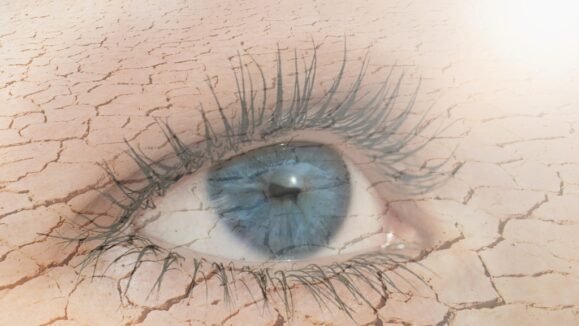Though disposable soft contact lenses like dailies may only be a transient moment in the life of the wearer, their relationship with the planet is far more toxic. Due to their composition, contact lenses are not completely biodegradable—and this is hurting our planet.
Wearing contact lenses impacts our environment more than we realize.1 Researchers in the US have found that up to 19% of surveyed contact lens wearers dispose of their lenses by flushing them down the sink or toilet. This results in an estimated total of 3.36 billion lenses being flushed into the sewage system annually.2
There are many layers to the harm that disposable contact lenses can cause to the environment. When contact lenses are disposed of, they undergo chemical interactions with microbes commonly found in wastewater. This process leads to the disintegration of the particles in contact lenses, resulting in microplastics1, which can wreak havoc across a broad range of the planet’s systems. For example, marine animals may mistake these invisible microplastics for food, eventually finding their way into our food chain.

A critical issue at hand
Considering the growing trend in contact lens prescriptions, will this issue continue to pose a threat to humans and aquatic life?
In 2019, there were already around 150 million contact lens users worldwide, and the number has continued to climb steadily over the last two decades.3 In particular, the use of daily disposables has grown twice since 2000, and there has been a spectacular increase in silicone hydrogel lens fittings as well.
Different categories of contact lenses produce different amounts of plastic waste. An earlier study looked at conventional systems (hard contact lenses), planned replacement systems (monthly disposable lenses), and daily disposables. The findings showed monthly disposables—which the researchers have defined as 12 lenses including a cleaning solution, and lens cases—generate the least waste (549 grams) compared to hard contact lenses (1,893 grams). This is because hard contact lenses category of usage is often bound together with the usage of its particular range of care supplies as well—for instance, saline, peroxide cleaners, contact lens cases, and other related items. Daily disposable systems, according to the study, produces 953 grams of plastic waste altogether.
Interestingly, an Arizona State University study4 estimated that nearly 21% of single-use disposable contact lenses users flush down their lenses, which could contribute to as much as 23 metric tons of plastic waste annually in the American wastewater system. Contact lenses in the wastewater were determined to break down into smaller fragments of microplastic which pose a risk of leaching into agricultural soil or into rivers and oceans when it rains. This was a first-of-its-kind study which attempts to measure the impact of contact lenses on the environment.
Furthermore, what presents a challenge in recycling contact lenses is their composition, which is based on different types of polymers and silicon that are distinct from typical household plastics that are relatively easier to recycle. Essentially, these are medical-grade plastics that are designed to endure harsh conditions.
Facing the issue head on
As concerns about the increasing accumulation of plastic-related wastes grow, the optometry industry and practitioners are stepping up to the plate in all efforts to reduce the environmental impact of microplastics.
In the United States, Bausch + Lomb has partnered with TerraCycle, a notfor- profit company that specializes in recycling hard-to-recycle plastics and materials, to launch the ONE by ONE Free Recycling Program. In the scheme, TerraCycle collects contact lenses and blister packs at various drop-off points via local optic shops that have opted to join the program.
More and more eye care professionals are picking up the torch and turning their shops into dropoff points for the recycling program. Since the partnership’s launch, the company reported that it has collected more than 41 million units of used contact lenses along with top foils and blister packs.4 And together with its newer program, the Biotrue® Eye Care Recycling program, it has recycled 41,358,603 units of used contact lenses and eye care material thus far.
Reducing carbon footprint
In addition to recycling, manufacturers also focus their efforts on reducing their carbon footprints during manufacturing processes and when designing contact lens packaging. For instance, Johnson & Johnson Vision Care’s improved manufacturing process for Acuvue Oasys with HydraLuxe has contributed to a 12% reduction in energy usage.
It also won an Environmental Leader Award in 2017 for its Acuvue Oasys 1-Day daily contact lenses that use 100% sustainable packaging with paperboard purchased from a Fiber Sourcing Certified plant. This green packaging has translated into a reduction of 57 tons in paper usage, and its lighter weight has resulted in 13% less energy usage during shipping and distribution.
Other contact lens manufacturers, such as CooperVision and Menicon in Japan, are also joining the sustainability movement by engaging in contact lens recycling initiatives.5
In Singapore, Capitol Optical has staked its claim as the country’s first contact lens recycling program, which helps to recycle foils and blister packs derived from sanitized aluminum and polypropylene. However, recycling contact lenses themselves has not been allowed yet by local authorities.

Pioneers of eco-friendly practices in the region
Programs like these are seeing practical enforcement and support in the industry. Dr. Jason Teh talked about the availability of a contact lens recycling bin at his practice, In2Eyes in Melbourne, Australia. “This is provided by contact lens companies in partnership with a recycling business, for example, Bausch + Lomb with TerraCycle,” he said.
“Patients can collect and bring the waste back when they come for follow-up appointments or to pick up their next contact lens supplies,” he shared. He added that this helps to bring awareness to patients regarding the impact of contact lenses on the environment.
“We also promote ortho-k contact lenses as an option, which allows patients to use the same hard lens for two years. This is a convenient and excellent reusable option,” Dr. Teh continued.
Similarly, Mr. Ryan Ho from Malaya Optical in Petaling Jaya, Malaysia, agrees with advocating for longerwear lenses, such as the RGP lenses, and those lenses designed for ortho-k fitting procedures.
Admittedly, noted Mr. Ho, awareness among Malaysian contact lens users about the environmental impact of contact lens waste is not high enough. “We know that plastic straws and plastic bags aren’t being reused, so they need to be recycled. Why not reduce the impact of contact lenses on the environment as well? Upon realizing how microplastics from contact lens waste could adversely affect us after entering the wastewater system, we would want our optometrists to educate patients not only about the hygienic practices of contact lens use but also about recycling their contact lenses,” Mr. Ho explained.
In India, Dr. Monica Chaudhry painted a different picture that is perhaps representative of numerous Asian countries like her native India—there is room for improvement when it comes to contact lens usage and environmental awareness.
She shared that plastic consumption in India remains relatively low per capita (11 kilograms per year compared to America’s 109 kilograms per year).6 However, an estimated 40% of its plastic waste is neither collected nor recycled and with a large population, this could have major repercussions on the environment. In 2022, however, the government imposed a ban on singleuse plastic to combat the issue of plastic pollution.7,8
“Considering all these, even contact lenses should be recycled. But I’m not sure if any of the practitioners in India are segregating them into bins nor advising our patients to do the same,” she shared. “However, your article could, at the very least, initiate the thought process to do so,” Dr. Chaudhry honestly remarked.
References
- The Environmental Cost of Contact Lenses. Available at https://www.eurekalert.org/newsreleases/
- Accessed on August 10, 2023.
- ASU scientists report 1st nationwide study showing environmental costs of lenses. Available at https://news.asu.edu/20180819-discoveries-asu-scientists-1st-nationwide-study-environmentalcosts-contact-lenses. Accessed on August 10, 2023.
- Morgan PB, Efron N. Global contact lens prescribing 2000-2020. Clin Exp Optom. 2022;105(3):298-312.
- Environ. Sci. Technol. 2020, 54, 19, 12102–12108, Publication Date:September 1, 2020 https://doi.org/10.1021/acs.est.0c03121
- Bausch + Lomb Reports More Than 41 Million Units Of Contact Lens, Eye And Lens Care Materials Recycled Through ONE By ONE And Biotrue® Eye Care Recycling Programs. Available at https://ir.bauschhealth.com/news-releases/2021/11 15-2021-115913359. Accessed on August 10, 2023.
- The Environmental Impact of Contact Lens Waste. Available at https://www.clspectrum.com/issues/2019/august-2019/the-environmental-impact-of-contact-lens-waste#reference-25. Accessed on August 10, 2023.
- Plastic bans spread in India. Winners and losers aren’t who you’d expect. Available at https://www.nationalgeographic.co.uk/environment/2019/02/plastic-bans-spread-in-india-winners-andlosers-arent-who-youd-expect. Accessed on August 10, 2023.
- India bans single-use plastic to combat pollution. Available at https://www.reuters.com/world/india/india-bans-single-use-plastic-combat-pollution-2022-07-01/. Accessed on August 10, 2023.
Editor’s Note: This article was published in COOKIE magazine Issue 13.





